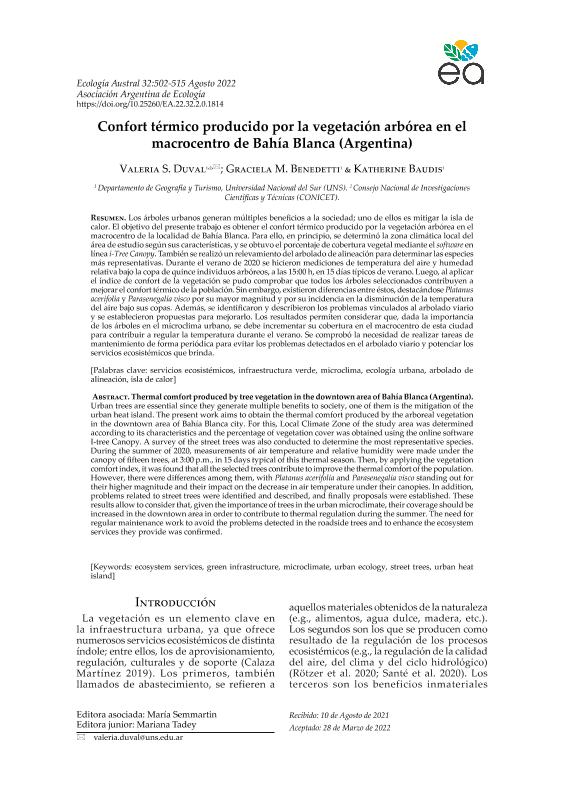Mostrar el registro sencillo del ítem
dc.contributor.author
Duval, Valeria Soledad

dc.contributor.author
Benedetti, Graciela

dc.contributor.author
Baudis, Katherine

dc.date.available
2023-12-27T14:34:54Z
dc.date.issued
2022-07
dc.identifier.citation
Duval, Valeria Soledad; Benedetti, Graciela; Baudis, Katherine; Confort térmico producido por la vegetación arbórea en el macrocentro de Bahía Blanca (Argentina); Asociación Argentina de Ecología; Ecología Austral; 32; 2; 7-2022; 1-14
dc.identifier.issn
0327-5477
dc.identifier.uri
http://hdl.handle.net/11336/221624
dc.description.abstract
Los árboles urbanos generan múltiples beneficios a la sociedad, uno de ellos es la mitigación de la Isla de Calor. El presente trabajo tiene como objetivo obtener el confort térmico producido por la vegetación arbórea en el macrocentro de la localidad de Bahía Blanca. Para ello, en principio se determinó la Zona Climática Local del área de estudio según sus características y se obtuvo el porcentaje de cobertura vegetal mediante el software online I-tree Canopy. También se realizó un relevamiento del arbolado de alineación para determinar las especies más representativas. Durante el verano del año 2020, se hicieron mediciones de temperatura del aire y humedad relativa debajo de la copa de quince individuos arbóreos, a las 15 h en 15 días típicos de esta estación térmica. Posteriormente se aplicó el índice de confort de la vegetación, donde se comprobó que todos los árboles seleccionados contribuyen a mejorar el confort térmico de la población. Sin embargo, existieron diferencias entre éstas, destacándose Platanus acerifolia y Parasenegalia visco por su mayor magnitud y su incidencia en la disminución de la temperatura del aire debajo de sus copas. Además, se identificaron y describieron los problemas vinculados al arbolado viario y se establecieron propuestas para su mejora. Los resultados permiten considerar que, dada la importancia de los árboles en el microclima urbano, se debe incrementar su cobertura en el macrocentro de esta ciudad con la finalidad de contribuir a la regulación térmica durante el verano. Se comprobó la necesidad de realizar tareas de mantenimiento de forma periódica para evitar los problemas detectados en el arbolado viario y potenciar los servicios ecosistémicos que brindan.
dc.description.abstract
Urban trees are essential since they generate multiple benefits to society, one of them is the mitigation of the urban heat island. The present work aims to obtain the thermal comfort produced by the arboreal vegetation in the downtown area of Bahía Blanca city. For this, Local Climate Zone of the study area was determined according to its characteristics and the percentage of vegetation cover was obtained using the online software I-tree Canopy. A survey of the street trees was also conducted to determine the most representative species. During the summer of 2020, measurements of air temperature and relative humidity were made under the canopy of fifteen trees, at 3:00 p.m., in 15 days typical of this thermal season. Then, by applying the vegetation comfort index, it was found that all the selected trees contribute to improve the thermal comfort of the population. However, there were differences among them, with Platanus acerifolia and Parasenegalia visco standing out for their higher magnitude and their impact on the decrease in air temperature under their canopies. In addition, problems related to street trees were identified and described, and finally proposals were established. These results allow to consider that, given the importance of trees in the urban microclimate, their coverage should be increased in the downtown area in order to contribute to thermal regulation during the summer. The need for regular maintenance work to avoid the problems detected in the roadside trees and to enhance the ecosystem services they provide was confirmed.
dc.format
application/pdf
dc.language.iso
spa
dc.publisher
Asociación Argentina de Ecología

dc.rights
info:eu-repo/semantics/openAccess
dc.rights.uri
https://creativecommons.org/licenses/by/2.5/ar/
dc.subject
SERVICIOS ECOSISTEMICOS
dc.subject
INFRAESTRUCTURA VERDE
dc.subject
MICROCLIMA
dc.subject
ECOLOGIA URBANA
dc.subject
ARBOLADO DE ALINEACION
dc.subject
ISLA DE CALOR
dc.subject.classification
Geografía Física

dc.subject.classification
Ciencias de la Tierra y relacionadas con el Medio Ambiente

dc.subject.classification
CIENCIAS NATURALES Y EXACTAS

dc.title
Confort térmico producido por la vegetación arbórea en el macrocentro de Bahía Blanca (Argentina)
dc.title
Thermal comfort produced by tree vegetation in the downtown area of Bahía Blanca (Argentina)
dc.type
info:eu-repo/semantics/article
dc.type
info:ar-repo/semantics/artículo
dc.type
info:eu-repo/semantics/publishedVersion
dc.date.updated
2023-12-27T10:59:07Z
dc.journal.volume
32
dc.journal.number
2
dc.journal.pagination
1-14
dc.journal.pais
Argentina

dc.journal.ciudad
Buenos Aires
dc.description.fil
Fil: Duval, Valeria Soledad. Consejo Nacional de Investigaciones Científicas y Técnicas. Centro Científico Tecnológico Conicet - Bahía Blanca; Argentina. Universidad Nacional del Sur. Departamento de Geografía y Turismo; Argentina
dc.description.fil
Fil: Benedetti, Graciela. Universidad Nacional del Sur. Departamento de Geografía y Turismo; Argentina
dc.description.fil
Fil: Baudis, Katherine. Universidad Nacional del Sur. Departamento de Geografía y Turismo; Argentina
dc.journal.title
Ecología Austral

dc.relation.alternativeid
info:eu-repo/semantics/altIdentifier/url/https://ojs.ecologiaaustral.com.ar/index.php/Ecologia_Austral/article/view/1814/1300
Archivos asociados
